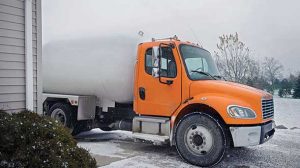Propane autogas safety

Switching to autogas from another fuel requires some driver education about safety and the differences between conventional fuels. Photo: iStock/RealCreation
As the autogas market continues to grow, many companies are switching from gasoline and diesel to propane autogas. This means that many drivers will be operating propane-powered vehicles for the first time.
According to Stuart Flatow, vice president of safety and training for the Propane Education & Research Council, switching to autogas from another fuel requires some driver education about safety and the differences between conventional fuels. Autogas vehicles have a long history of performing safely under all operating conditions.
Drivers operating propane autogas vehicles for the first time should become familiar with the key components of their new vehicle before they get on the road. Drivers should perform visual checks of their vehicles and fuel systems and make sure vehicle markings are present and visible.
Remind drivers that autogas offers some safety advantages compared with other fuels:
- Autogas systems are designed and engineered with safety features such as pressure-relief valves, overfill protection devices and shutoff valves that automatically close if the fuel line ruptures.
- Among alternative fuels, autogas has the narrowest flammability range.
- Propane autogas is odorized so it can be easily detected in the unlikely event of a leak.
- Autogas components offer superior durability. Unlike gasoline tanks that are made of composite materials or aluminum, for instance, propane autogas tanks are made of steel.
Drivers can rest easy knowing vehicles fueled by propane autogas provide performance that is comparable to that of conventionally-fueled vehicles. The difference in the driving experience is negligible, though drivers may notice a slight delay in ignition time as the fuel system pressurizes.
As with any motor vehicle fuel, operator and passenger safety is the highest priority. Drivers should always follow manufacturer recommendations and their company’s policies to help ensure a safe and comfortable driving experience.
Bobtail driver safety and the safety of others on the road are of the utmost importance. At the NPGA Propane Expo in Atlanta, Del Lisk, vice president of safety services at Lytx Inc., a company that provides in-cab video monitors, discussed bobtail impact and the areas on a bobtail most likely to experience a collision. Some common causes of on-road incidents are texting/cellphone use, speeding, falling asleep/fatigue, aggressive driving and alcohol and drugs, Lisk noted.
















